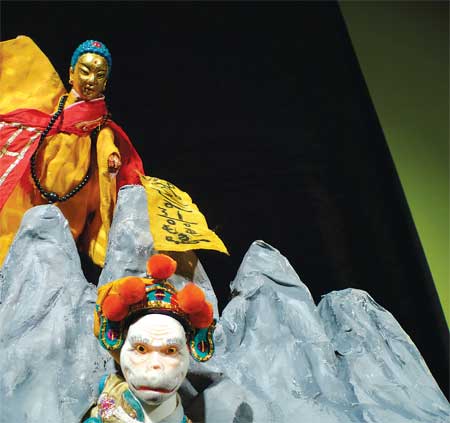Monkey King comes alive
Traditional Taiwanese puppet troupe I-Wan-Jan is bringing Da Nao Tian Gong (Uproar in Heaven) to Beijing this weekend, a chance for people in the city to get up close and personal with the old art form.
|
I-Wan-Jan's Tathagate and Monkey King in action. [Global Times] |
Telling the popular story of the Monkey King rebelling against the Jade Emperor of Heaven, Da Nao Tian Gong is based on the early chapters of classic story Journey to the West created by Ming Dynasty (1368-1644) novelist Wu Cheng'en (circa 1501-1582).
"The story showcases the imagination of folklore. With the puppet show, the audience can not only appreciate the story, but also enjoy the artistry in the characters, such as the armor of the Imperial guards," explained Lin Yung-Chih, director of I-Wan-Jan.
A third-generation puppeteer, 36-year-old Lin began learning the art form as a teenager.
"Its charm lies in the figure images of the puppets, the skill of the actor and the combination of the stage set, music and voices together," he said. "Like close-up magic, it demands strict requirements of the main actor. There is one main actor and three assistants who are responsible for all characters in the play, even though 20 may appear." Playing at China Puppet Theater, the show appeals to children and adults alike, according to Lin. Four actors and eight musicians will present the production in Beijing, with 34-year-old Huang Chiao-Wei responsible for the voices of almost all 20 characters.
"Huang Chiao-Wei is a veteran and very talented," Lin said. "He learnt from a very young age. Talent like him is quite hard to find, that is the most difficult part in developing the art form."
Founded in 1931 by master puppeteer Lee Tien-Lu, I-Wan-Jan has earned a reputation for excellence in craftsmanship and is one of the most well-known puppet troupes in Taiwan.
"We have lots of old scripts to perform and we want to keep the skill and craft left by our original masters," Lin explained. "We have also created new characters and storylines to cater to today's audience."
Taiwan puppet shows are also known as Budai Drama, or Hand Puppet Drama. Generally the head, hands and feet of the puppet are made of wood and the body is made of cloth. The actor puts their hand into the cloth to operate the puppet, accompanied by a narrator or voice artist and traditional instruments such as a gong, flute, erhu (Chinese violin) and yueqin (moon guitar). "Like Peking Opera, it has seven kinds of characters, including sheng (male lead), dan (female character) and chou (clown)," Lin explained.
 0
0 







